Turkey Tail Mushroom Scientific Name: Trametes versicolor (Linnaeus: Fries) Pilat. Previously, it was also known by other names such as Coriolus versicolor and Polyporus versicolor. This species belongs to the Polyporaceae family, Aphyllophorales order, Hymenomycetes class, and Basidiomycota phylum. In English, it is called Turkey Tail, in Japanese it is known as Kawaratake, and in Chinese, it is referred to as Yun Zhi.
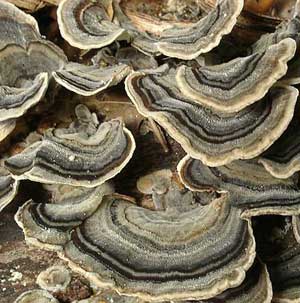 |
|
(Image: pilzfotopage) |
This medicinal mushroom has been used in China for over 2000 years and can now be cultivated successfully using simple techniques in Vietnam. The original strain is stored at the Microbial Type Culture Collection (VTCC) at the Vietnam National University in Hanoi.
Characteristics of Turkey Tail Mushroom: The cap is stemless, tough, flat, or slightly curled, resembling a semicircle. The caps usually grow in clusters, with diameters ranging from 1 to 8 cm, thickness of about 0.1-0.3 cm, and a small hairy surface featuring concentric rings of brown, blackish-gray, and opaque white colors. The edge is thin and wavy. The flesh is white. Spores are cylindrical, colorless, measuring 4.5-7 mm x 3-5 mm. In nature, Turkey Tail mushrooms typically grow on decaying wood.
Growing Turkey Tail mushrooms is similar to cultivating Wood Ear mushrooms or Oyster mushrooms in thin plastic bags containing one of the following substrates:
* Sawdust – 78%, Rice bran – 20%, Granulated sugar – 1%, Gypsum powder – 1%
* Sawdust – 40%, Sugarcane bagasse – 40%, Ground straw – 20%
* Grinded cassava stems – 80%, Gypsum powder – 20%
Mix these ingredients with water to achieve about 60% moisture. If water begins to ooze out between your fingers when squeezed, it is suitable. Place into thick PP plastic bags approximately 5mm thick, sized 17 x 33 cm or 25 x 35 cm. Each bag holds about 250-300g of substrate. Create an opening in the bag using a piece of plastic tubing to insert the thin film and seal with a cotton plug. Before sterilization, wrap the cotton plug with newspaper.
Sterilize using steam like boiling sticky rice cakes, typically steaming for 10 hours, then let cool overnight before removing these bags.
Transfer to a inoculation room and use strains purchased from seed supply centers for inoculation. In northern provinces, plan to order seeds 3 months in advance (contact by phone at 0913523578). In southern provinces, order seeds 2 months in advance (contact by phone at 0905543535).
Remove the cotton plug and inoculate the substrate using sterile techniques with a metal spoon heated over a flame. The inoculation rate is usually between 0.7-1% of the substrate. To ensure the inoculum penetrates deeply, prepare a wooden dowel to create a funnel shape by pressing down firmly into the substrate from above.
Replace the cotton plug and stack the bags on a rack or hang them sequentially using three nylon strings from a bamboo pole (or PVC pipe) suspended from the ceiling. Thread the bags through the three strings, tying them at the top and bottom (similar to cultivating Wood Ear or Oyster mushrooms).
Wait until the mycelium completely colonizes the bag before preparing to cut the bag for Turkey Tail mushrooms to grow out. The best conditions for rapid mycelium growth are to maintain room temperature between 19-25°C. In southern provinces and during summer in northern regions, create a cool microclimate by using an industrial exhaust fan at one end of the room, while the opposite end pumps water from a well over a wall made from water-absorbing material (similar to setups in industrial pig farms). If possible, using air conditioning equipment is ideal.
Harvest Turkey Tail mushrooms in clusters, ensuring to cut off the stems to allow for new clusters to grow. Dry and package them. The domestic market price is about 400,000 VND/kg of mushrooms. If there is a surplus for export to Hong Kong, the price can reach several million VND/kg.
Why have China, Japan, and many other countries recently favored Turkey Tail mushrooms? Because scientists have discovered that Turkey Tail mushrooms contain polysaccharides such as PSK (Polysaccharide Krestin) and PSP (Polysaccharopeptide), which have been shown to inhibit cancer cells and boost the immune system’s activity. Therefore, Turkey Tail mushrooms are used to treat hepatitis caused by the HBV virus and to slow the progression of liver cancer and various other types of cancer. PSK was first extracted in Japan in the late 1960s, while PSP was isolated in China in 1983. The compositions of the
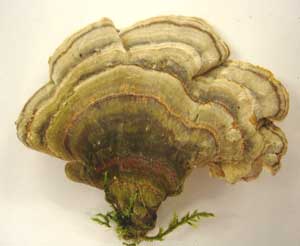 |
|
(Image: unileon) |
PSK and PSP are relatively similar chemically and have a molecular weight of about 100 kDa. Their polypeptide components contain a significant amount of aspartic acid and glutamic acid. The polysaccharide component consists of single sugar chains (monosaccharides) linked together by α-(1-4) and β-(1-3) glucosidic bonds. The main difference between PSK and PSP is that PSK contains fucose, while PSP contains rhamnose and arabinose.
Additionally, both contain galactose, mannose, and xylose. PSK and PSP enhance the immune system by increasing the specificity of T cells and antigen-presenting cells like monocytes and macrophages. Their biological activity is manifested in their ability to increase the number of white blood cells, produce IFN-γ and IL-2, and delay hypersensitivity reactions. Numerous studies have demonstrated that PSK and PSP can activate host immune cells and components. Moreover, both substances inhibit the growth of cancer cell lines and exhibit anticancer activity in vivo (Tzianabos. Clinical Microbiology Reviews. 2000; 13: 523-533). Notably, in 1987, PSK alone accounted for 25% of all medicinal materials used against cancer in Japan.
The successful use of PSK in treating head and neck cancers, colorectal cancer, lung cancer, and breast cancer has been documented through numerous clinical trials over the past few decades. Most medical trials using PSK have been conducted in Japan. PSK has been used as an immunotherapy for many stomach cancer patients more than for patients with other cancer types.
In the early 1970s, Kaibara’s research group conducted trials using PSK to treat stage 4 cancer patients alongside chemotherapy. After surgical removal of the cancer, 66 patients received 3 grams of PSK daily in addition to the chemotherapy regimen of Mitomycin C and 5-fluorouracil (5-FU). The survival rate of these patients over two years doubled compared to those not treated with PSK (Kaibara et al. Japanese Journal of Surgery. 1976; 6: 54-59). Fujimoto et al.’s subsequent study in 1979 (Japanese Journal of Surgery. 1979; 3: 190-196) with a larger number of patients (n=230) yielded similar results. Further studies by Hattori et al. (Japanese Journal of Surgery. 1979; 9: 110-117) (n=110) and Kodama et al. (Japanese Journal of Surgery. 1982; 12: 244-248) (n=450) indicated that PSK could protect against immunosuppression commonly associated with surgery or long-term chemotherapy. In summary, the use of PSK in conjunction with standard chemotherapy significantly improved survival and recovery rates (Nakazato et al. Lancet. 1994; 343: 1122-1126).
Recently, there has been considerable research into the use of PSK alongside treatments such as chemotherapy, radiotherapy, and immunotherapy to improve survival rates for esophageal cancer patients (Ogoshi et al. Cancer Investigation. 1995; 13: 363-369) and nasopharyngeal cancer (Go and Chung. Journal of International Research. 1989; 17: 141-149). Sankyo and Kureha companies in Japan have marketed the product Krestin since 1977, priced at 1000 Yen for a 1g package. The drug is effective for treating various gastrointestinal cancers, lung cancer, and breast cancer.
While the discovery and testing of PSK were primarily conducted in Japan, PSP extracted from Turkey Tail mushrooms is a product from China, and its safety and efficacy are still being investigated and assessed by scientists and cancer researchers. Since its initial discovery in 1983, there have been significant advancements in clinical trials involving humans. Phase I clinical trials conducted by Xu (PSP International Symposium Anthology of Theses and Abstracts. 1993; 179-182) resulted in positive outcomes with a daily intake of 6g of PSP without adverse effects.
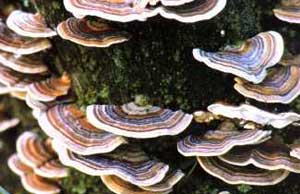 |
|
(Image: uco.es) |
. Patients reported improved appetite and overall health, along with stabilized hematopoietic indices. Phase II of the PSP study was conducted by a research team from Shanghai in 8 hospitals in Shanghai focusing on patients with gastric cancer, lung cancer, and esophageal cancer. Over 300 patients at Shanghai hospitals were treated with radiation therapy or chemotherapy combined with the use of PSP. Results showed significant improvements in clinical manifestations as well as hematological and immune indices in the patients. Phase III trials involved a larger number of patients (600 individuals). These studies indicated that PSP has a protective effect on immune function in patients undergoing conventional treatment.
Many studies have shown that Coriolus versicolor (Turkey Tail mushroom) has an inhibitory effect on HIV (W. Adriaan Smith; http://www.naturalmedicine.co.za). In vitro studies have demonstrated that the PSP compound may have beneficial effects against HIV-1 virus infection (Collins and Ng. Life Sciences. 1997; 60: PL383-387). Numerous studies have indicated the ability of PSP to hinder the binding of HIV-1 virus to host cells. PSP also exhibits significant inhibition against the reverse transcription process of HIV-1 at the in vitro level. CoriolusVPS, a product extracted from Turkey Tail mushroom, contains 36% beta 1-4, 1-3, 1-6 glucan (protein-bound polysaccharide) from Mushroomscience (Fax: 541-344-3107), priced at up to $59.95 per box (containing 90 capsules, 625mg each). According to US Patent No. 4,202,969, this product contains 42-43% soluble carbohydrates (91-93% is beta-glucan), 28-35% protein (amino acids), 6-7% ash, and moisture content of 7-7.6%. The bottled product branded Trametes (http://www.oftheearth.co.uk) from the UK (8 oz., about 227g) costs up to $50. This medication is advertised to stimulate immunity, combat hepatitis viruses, prevent and treat cancer, and fight infections in the respiratory, urinary, and digestive tracts.
The anticancer effects on lung cancer have also been demonstrated in a recent publication by K.W. Tsang et al. (Respir. Med. 2003; 97: 618-624). The I’m-Yunity branded product from Winsor Health Products (http://www.shen-nong.com) contains capsules (60 or 100 capsules, 400mg) made from extracts of Turkey Tail mushroom fibers that have been identified to enhance the immune capacity of the body. Liver damage and the mortality rate in mice injected with influenza virus significantly decreased when treated with polysaccharopeptides extracted from Turkey Tail mushroom (Chen et al. Kangshengsu. 1986; 11: 390-395). In 1996, Dong et al. observed that polysaccharides from Turkey Tail mushroom could inhibit the proliferation of human liver cancer cell line (HEPG2), although it did not inhibit embryonic human liver cells (Dong et al. Res Commun Mol Pathol Pharmacol. 1996; 92: 140). Previous studies have indicated that besides its effects against viruses, PSP is also effective in protecting the liver from hepatotoxic substances in experimental animals and reducing toxicity. Several mechanisms have been proposed for its liver protective effects, including direct binding of PSP to toxic agents. PSP may also initiate the re-establishment of hematopoietic functions in irradiated mice. At Seoul University (South Korea), the effects of Turkey Tail extracts on liver cancer have been thoroughly studied by a team of scientists led by Prof. Byong Kak Kim (http://www.begellhouse.com/journals). Research on the application of medicinal Turkey Tail mushrooms has resulted in no less than 400 published works in international journals (http://www.mushroomscience.com).
Some Pharmaceuticals Made from Turkey Tail Mushroom
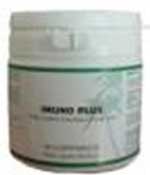 |
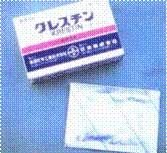 |
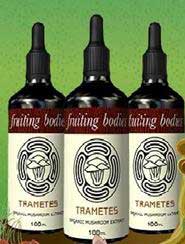 |
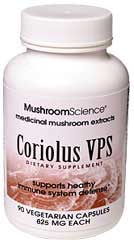 |
In China, many studies have proven that extracts of Turkey Tail mushroom can inhibit 40-95% of cancer cell growth, with no significant side effects reported (Lâm Thụ Tiền, editor, Traditional Chinese Medicine Mushrooms, China Agricultural Publishing House, 2001). Between 1975 and 1979, research conducted by biologists at Northeast Normal University demonstrated that the product Vân Chi Can Thái from Changchun Pharmaceutical Company had a significant effect in treating chronic hepatitis caused by HBV virus.
In 1981, the Sichuan Antibiotic Research Institute used submerged cultured Turkey Tail mushroom products to extract intracellular and extracellular polysaccharides and collaborated with Chongqing Pharmaceutical Company to produce a drug called Vân Tinh for treating hepatitis caused by HBV virus and primary liver cancer, achieving good results. The Laoshan Pharmaceutical Company in Nanjing extracted polysaccharides from Turkey Tail mushroom to create Vân Chi multi-sugar capsules for treating chronic hepatitis B and liver cancer. The Shanghai Traditional Chinese Medicine Workshop cultivated Turkey Tail mushrooms from sugarcane waste and extracted polysaccharides to create Vân Chi bacteria for treating chronic hepatitis B.
The Mycology Research Institute of the Shanghai Academy of Agricultural Sciences extracted polysaccharides from Turkey Tail mushrooms and collaborated with pharmaceutical companies to produce Vân Chi multi-sugar CVP for treating hepatitis B patients. In 1993, biologists at Shanghai Normal University employed submerged cultivation methods to obtain Turkey Tail mycelium and collaborated with New Health Pharmaceutical Company to produce PSP polysaccharopeptide for clinical applications in conjunction with surgical or chemotherapy treatments for lung, gastrointestinal, and breast cancers.
In addition to PSK and PSP, Yang et al. (Am J. Chin. Md. 1992; 20: 221-232) extracted another type of peptide from the crude extract of polysaccharopeptides from Turkey Tail mushroom. This peptide exhibited higher anticancer activity compared to PSK and PSP and had potential effects on the immune system (increasing white blood cell count and IgG levels in mice). This peptide also showed toxicity against cancer cell lines in in vivo experiments in mice (Jang and Chen. US Patent 5,824,648. 1998).
The Biotechnology Research Center of Vietnam National University is currently establishing a fermentation workshop with automatically controlled fermenters to advance research on the extraction of pharmaceuticals from Turkey Tail mushroom biomass. Collaboration with pharmaceutical companies is anticipated in the near future.


















































